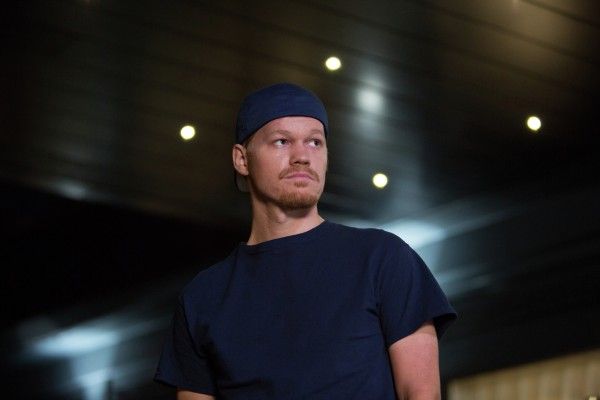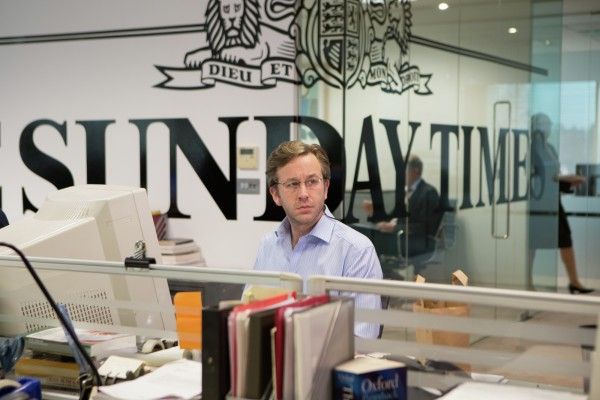The story of Lance Armstrong is a lesson we should know by now: worshipping athletes is a dubious proposition. When he finally confessed to cheating, I personally greeted it with a shrug. That’s partly because I don’t care about competitive cycling, but also because he’s not the first athlete to use performance-enhancing drugs, and he won’t be the last. The massive scope of Armstrong’s cheating doesn’t automatically make his story more interesting, and Stephen Frears’ bloodless drama The Program doesn’t have a hook. It’s a polished docudrama that paints Armstrong as a sociopath, and Ben Foster’s strong lead performance can’t save a film that lacks a unique angle on a story that’s been reported to death.
The Program dryly goes through the bullet points of Armstrong’s rise and fall, starting all the way back in 1993 when Armstrong wanted to ride honestly. However, he quickly discovers that the game is already rigged by biology: those with a certain body type and who can hold more oxygen in their blood will always outlast everyone else. Following his cancer treatment, Armstrong resolves to work with Dr. Michele Ferrari (Guillaume Canet playing the character as a borderline mad scientist) to develop a program that will give Armstrong and his team the edge to compete. However, sports journalist David Walsh (Chris O’Dowd) notices Armstrong’s vast improvement, and begins digging, which only further entrenches the scheming cyclist. The movie, also factors in Armstrong’s ex-teammate and whistleblower Floyd Landis (Jesse Plemons), and his decision to bring down the once-beloved, seven-time Tour de France champion.
The main problem with The Program is that it indifferently conveys a series of events without providing any emotional or thematic perspective. Armstrong is the central figure, but the movie seems almost hesitant to dig into his psychology. It’s as if Frears is afraid of showing any sympathy towards Armstrong, so he paints him like a total sociopath, which may be the case. But as the film goes on, what starts as a measured performance becomes a cartoon villain who spouts lines like, “I have the money and the power to destroy you,” to a competitor in the middle of a race. Foster does what he can with the character, but he can’t command the screen when Frears’ lacks focus.
Landis could have been a reasonable protagonist with his religious background and instrumental role in bringing Armstrong down, but he’s reduced to a function of the plot. Frears is more fascinated with how everything came together rather than the why. Why did someone like Landis cheat and is there any redemption for him? The Program never digs into his actions, and even at the surface level of how he factors into the story, Frears never explains why Landis chooses to draw the line at selling the team’s bikes to get drugs. Wouldn’t the team get new bikes? I’m no cycling expert, but presumably they need bikes to finish the race.
Frears also could have chosen Walsh as his protagonist and made this an investigative journalism story, but that would take us away from Armstrong even though Armstrong isn’t an interesting character. However, Walsh could have made the larger story an indictment of hero worship and why Armstrong was allowed to succeed for so long. But since Frears doesn’t seem to have a take on the material, Walsh only matters in terms of the timeline regarding Armstrong’s rise and fall. What the rise and fall means in a larger context is completely ignored.
More than once in The Program, the characters reference that a movie is being made about Armstrong. This is during the height of his popularity, and it makes sense why—it’s an easy “hero” narrative. Armstrong had done a spectacular job of selling an easy story of “Cancer Survivor Becomes World Champion”, and I imagine it probably would have been a boring film. But The Program, despite its polish and strong performances, proves that a hatchet job is just as uninteresting as hero worship. The Program won’t make you reevaluate Armstrong, the roll of PEDs in sport, our craving for hero athletes, or anything. It holds your hand, points out the rise and fall of Armstrong, stomps on a reputation that’s already in tatters, and abruptly ends. The Program may be the first non-documentary about Armstrong, but it’s a meaningless film that’s won a meaningless race.
Rating: C-
Click here for all of our TIFF 2015 coverage thus far or peruse links to our reviews below:
- 45 Years
- Baskin
- Being Charlie
- Black Mass
- Colonia
- The Danish Girl
- Dheepan
- Eye in the Sky
- Green Room
- Hitchcock/Truffaut
- I Smile Back
- The Iron Giant: Signature Edition
- Kill Your Friends
- Legend
- The Lobster
- Love
- Maggie's Plan
- The Martian
- Men & Chicken
- Sicario
- Trumbo
- Truth
- Victoria
- Where to Invade Next



